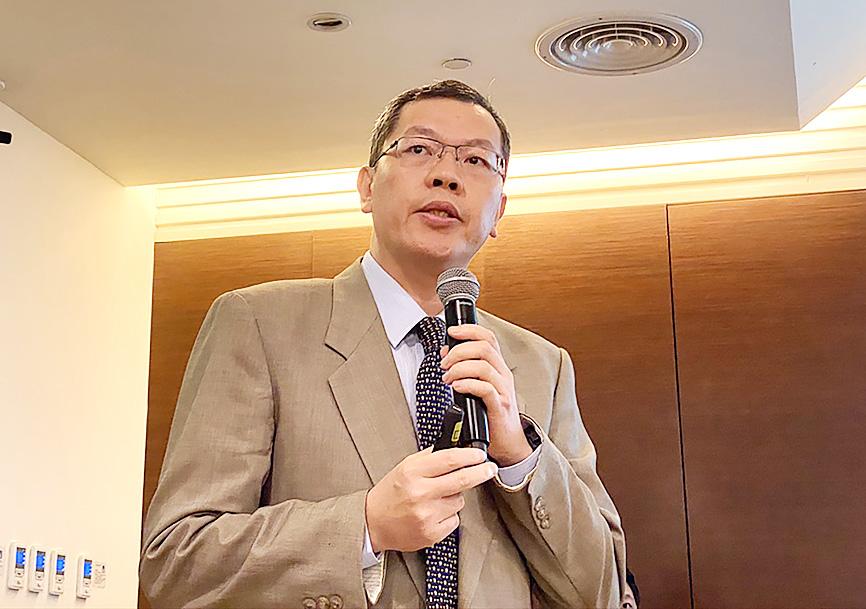Leading industrial PC maker Advantech Co (研華) yesterday gave a positive outlook for this quarter, saying that good order visibility would extend into the first half of next year.
The company expects revenue to grow by 0.6 to 4.2 percent quarter-on-quarter to US$510 million to US$530 million in the third quarter, with operating margin improving to 16 to 18 percent.
Advantech chief financial officer and president of general management Eric Chen (陳清熙) said that component shortages caused a “relatively higher rate of deferred orders in North America,” but Advantech is benefiting from projects resumed after COVID-19 lockdowns.

Photo: CNA
“In all remaining markets we are expecting to see double-digit percentage growth rates,” Chen told an investors’ conference in Taipei. “We are benefiting from soaring demand for infrastructure, green energy and smart healthcare, and overall business momentum is strong.”
Advantech reported a net profit of NT$1.79 billion (US$64.3 million) in the second quarter, down 22.4 percent from a year earlier, or earnings per share of NT$2.31.
Revenue was NT$14.21 billion, up 1.4 percent year-on-year and marking the second-highest level in the company’s history.
With stronger order momentum from clients, the company's book-to-bill ratio for the second quarter was 1.72, a historical high, it said.
In the first half of the year, net profit rose 2.8 percent year-on-year to NT$3.7 billion, or earnings per share of NT$4.79, while revenue increased 8.2 percent to NT$27.37 billion.
Orders rose 80 percent year-on-year thanks to improved demand for industrial computers, servers and other industrial applications, the company said.
“Advantech adopted a proactive approach, such as signing long-term agreements to guarantee supply commitments, as well as introducing alternative component sources,” chief operating officer Jamie Lin (林東杰) said. “Advantech also plans to scale up production at its Taoyuan and Kunshan sites simultaneously. It is expected that production capacity will increase by 30 percent in the second half of the year in preparation for the expected rush of orders after the shortage is alleviated.”
The company is adopting a new Globally Integrated Regional Competence strategy, which would “strengthen local services,” Chen said.
This strategy would first be implemented in Japan and South Korea, he said.
“Combined revenue from Japan and South Korea aims to exceed US$400 million by 2025, and the same business concept would gradually be implemented in China and Taiwan,” he added.
Separately, PC brand Acer Inc (宏碁) yesterday reported a net profit of NT$2.9 billion for the second quarter, up 142.5 percent year-on-year, the highest level in 11 years.
Revenue was NT$79.78 billion, while gross margin and operating margin were 12 and 5 percent respectively, it said.
“Demand in the PC business remained higher than supply, with visibility to the end of this year,” Acer said in a statement.
In the first half of the year, Acer's revenue was NT$151.33 billion, with net profit of NT$5.64 billion, up 221.8 percent year-on-year.

SEEKING CLARITY: Washington should not adopt measures that create uncertainties for ‘existing semiconductor investments,’ TSMC said referring to its US$165 billion in the US Taiwan Semiconductor Manufacturing Co (TSMC, 台積電) told the US that any future tariffs on Taiwanese semiconductors could reduce demand for chips and derail its pledge to increase its investment in Arizona. “New import restrictions could jeopardize current US leadership in the competitive technology industry and create uncertainties for many committed semiconductor capital projects in the US, including TSMC Arizona’s significant investment plan in Phoenix,” the chipmaker wrote in a letter to the US Department of Commerce. TSMC issued the warning in response to a solicitation for comments by the department on a possible tariff on semiconductor imports by US President Donald Trump’s

The government has launched a three-pronged strategy to attract local and international talent, aiming to position Taiwan as a new global hub following Nvidia Corp’s announcement that it has chosen Taipei as the site of its Taiwan headquarters. Nvidia cofounder and CEO Jensen Huang (黃仁勳) on Monday last week announced during his keynote speech at the Computex trade show in Taipei that the Nvidia Constellation, the company’s planned Taiwan headquarters, would be located in the Beitou-Shilin Technology Park (北投士林科技園區) in Taipei. Huang’s decision to establish a base in Taiwan is “primarily due to Taiwan’s talent pool and its strength in the semiconductor

Industrial production expanded 22.31 percent annually last month to 107.51, as increases in demand for high-performance computing (HPC) and artificial intelligence (AI) applications drove demand for locally-made chips and components. The manufacturing production index climbed 23.68 percent year-on-year to 108.37, marking the 14th consecutive month of increase, the Ministry of Economic Affairs said. In the first four months of this year, industrial and manufacturing production indices expanded 14.31 percent and 15.22 percent year-on-year, ministry data showed. The growth momentum is to extend into this month, with the manufacturing production index expected to rise between 11 percent and 15.1 percent annually, Department of Statistics

An earnings report from semiconductor giant and artificial intelligence (AI) bellwether Nvidia Corp takes center stage for Wall Street this week, as stocks hit a speed bump of worries over US federal deficits driving up Treasury yields. US equities pulled back last week after a torrid rally, as investors turned their attention to tax and spending legislation poised to swell the US government’s US$36 trillion in debt. Long-dated US Treasury yields rose amid the fiscal worries, with the 30-year yield topping 5 percent and hitting its highest level since late 2023. Stocks were dealt another blow on Friday when US President Donald